#bonus terme
Text

Hello Madam. Sorry Madam.
[First] Prev <–-> Next
#poorly drawn mdzs#mdzs#wei wuxian#lan wangji#madam jin#jin zixuan#jiang yanli#'Hey what is WWX trying to do here?' some kind of grab-and-twist maneuver that would be very upsetting to watch.#I know LWJ technically assists WWX in this scene in terms of blocking someone's blow on his behalf -#- but let's be honest. Real friends stop you from doing the truly stupid things.#Or maybe it was envy. Penis envy. The non-freudian kind.#Regardless...man this whole scene was just full of “and then someone else walks in”.#I swear to god every cultivator who is supposed to be hunting ends up wandering into this part of the woods.#a bonus for me because it gives me several good joke opportunities.#Madam Jin gets top prize for best entrance and exit. I wish her all the best. And a divorce…madam please leave him…#And can we please address the horses? I love horses. But why...why do they ride in on horses when they HAVE FLYING SWORDS?#I can only imagine it is for the dramatic flair? It just feels so jarring hearing someone clip clop in#and then another person swoop in on a sword.#The rules of mdzs's world can get fuzzy and I have to nod in an impressed manner at how much MXTX gets away not explaining.#Maybe the sword gets tired after a while and they need to give it a break? Maybe there is a sword union that dictates working hour limits?#…Would that make Chenqing a scab? Oh god it would… unions *hate* this flute!
1K notes
·
View notes
Text
I just keep circling back to “I find the artifacts/Cried over a hat/Cursed the space that I needed/I trace the evidence/Make it make some sense/Why the wound is still bleeding” as we slowly get more information about this album.
#taylor swift#ttpd#the tortured poets department#hits different#especially since hd is in kinda a weird space in terms of midnights as a whole#like she worked with both Aaron and Jack on it and it wasn’t part of the 3 am or standard and is just a bonus track
921 notes
·
View notes
Text

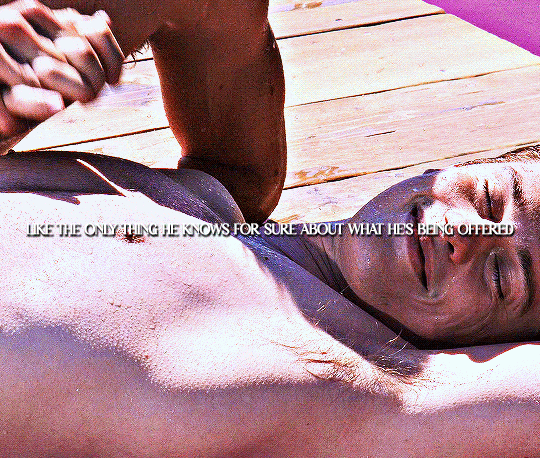

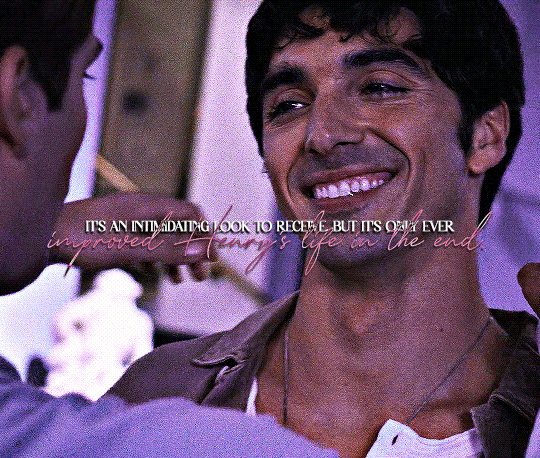
He kisses Henry's knuckle, just below his ring.
"I have some ideas."
#rwrb#rwrbedit#red white and royal blue#firstprince#userninz#chrissiewatts#userveronika#usersteen#usernuria#userclara#usergayppl#mine*#omg a rwrb edit at long last#its time for a bonus chapter edit#'he wants it completely' youre gonna get it baby!!!!!!!#get me this sequel now. i need to see them falling in love all over again but on their own terms#and figuring out all the things they never knew about each other and themselves#ussjkdhgds god.#something about them persevering through it all and it ultimately making both of their lives better :(#JUST BELOW HIS RING
607 notes
·
View notes
Text
masc term likers, your f/o(s) love seeing you both dressed really good or simply with pajamas and messy bed hair so much that they often have the irresistible urge to pull you close and mumble near your ear: ‘you’re so incredibly handsome, did you know that?’
#if they swear: ‘you’re so fucking handsome right now’ btw. Smiles#bonus if theyre not flirty but shy about it by the way#saying it in a low mumble and everything#transmasc selfshippers i love you guys forever and ever#-from a transmasc selfshipper#self ship#self shipping#f/o imagines#masc term self ship imagines
587 notes
·
View notes
Text
yknow i joke about pjo fandom being "ableism fandom" cause of how ironically the fandom behaves about disability themes in the franchise (and within the community) but the notes on that one post are apparently indicating the majority of the fandom legitimately did not process any disability themes in the entirety of the series besides being explicitly told in direct terms that demigods have adhd/dyslexia and that actually explains a lot
#pjo#riordanverse#disability#idk what to tag this im just exhausted#honorary mention to the only other time the fandom can apparently identify themes outside of it being directly spelled out for them#is when utilizing extremely stereotyped depictions/concepts/etc about said thing#and either way a solid 80% of the time they end up being ableist about it#also bonus shoutout to the extension of this being when the fandom tries to apply it on their own but all they know is the stereotypes#or just spelling it out in direct terms but never actually depicting it#two things that have now just become standard in the source material
178 notes
·
View notes
Note
WOMEN 😩
oh ABSOLUTELY.
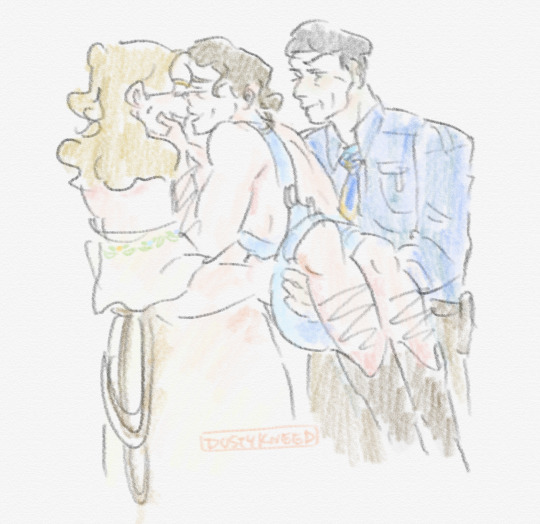
(based on this f!bones dedicated to @muirmarie in spirit :3333 🩵💙💛)
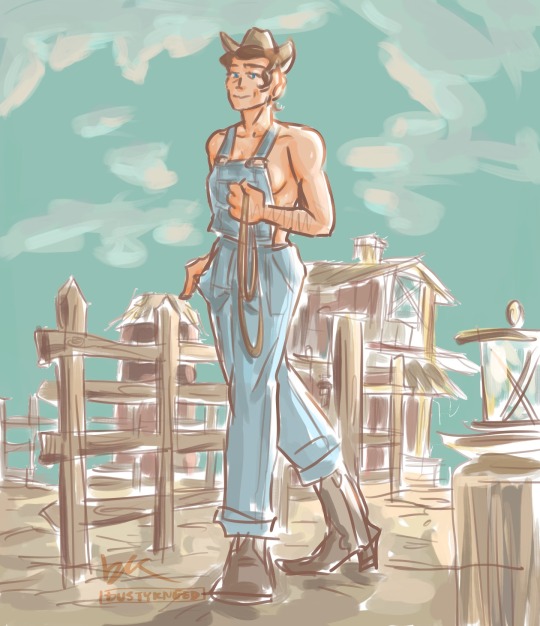
#star trek#star trek fanart#star trek tos#star trek the original series#fem!trek au#mcspirk#mcspirk fanart#mckirk#spones#mckirk fanart#spock#jim kirk#bones mccoy#leonard mccoy#leonard bones mccoy#let's go lesbians#ugh im eepy ..... if you see any errors in the notes app scribble no you dont (lie) (i did it as quickly as possible bc tired lol)#btw muir if you're reading this know that all of this is dedicated to you in my heart <333333333#uhhh in terms of context.... maybe a farm planet or something? with a western thing goin on?#look i have a desperate need to see 1. f!jim in nightie and 2. f!spock in sheriff apparel. and also lady bones in overalls obviously#ok night night now hope yalls day treats ya kindly !!!!!#fun fact the bones illustration has been sitting in my finished folder for MONTHS lol#love when adhd. but i was determined to give it the mcspirk bonus i intended and i did it yayyy
140 notes
·
View notes
Text
You guys ever think about how these next few episodes will probably be the last bit of main-series content we'll get for around two to three years
#I mean I don't doubt we'll probably get a bonus episode for Arei and the culprit#and I wouldn't be surprised if we got another MV#but in terms of main-series this is what we'll have for a very long time#it makes me sad but also excited because I KNOW this fandom is gonna pump out some awesome shit#{🍀It is an equal failing to trust everybody and to trust no one at all. and to trust no one at all.🌟}#danganronpa despair time#drdt
70 notes
·
View notes
Text
Bonus 3
I so frequently have to start these intros with “where were we?”, because I so frequently confuse even myself with regard to where any given in-progress story left off... typically it’s a cliffhanger of some sort, but off of, or onto, which specific cliff were we hanging? Well. Here in this continuation of a Christmas tale, we—or rather, Myka and Helena—were suspended in a broken-down elevator in an accounting firm’s office building in Cleveland. Something might’ve been juuuuust about to happen (see part 2 for what that something probably was, and part 1 for the causal chain that got them there), but a voice interrupted, seemingly from on high.
Bonus 3
“Is everybody okay in there?” the voice from heavenward repeats.
Myka looks up, this time confronting not her own reflection but a dark emptiness, one that is partially filled by... a firefighter?
She is sorely tempted, in the moment, to proclaim that everybody in here is most certainly not okay, given that she herself is among that “everybody” and is ready to spit nails at the timing of this supposed rescue... she talks herself down, though, because the firefighter certain doesn’t need to be informed about the grinding frustration of unrealized near-certainty.
The firefighter, most likely concerned about the lack of response, goes on, “If you’re in distress, we can hoist you up through here, get you faster help. If you’re okay, you can wait till we let the car down to the next level and get the doors open. Then you’ll be able to walk out.”
Myka looks at Helena, and they are on the same page regarding being hoisted. “Walk,” they both say.
“Good choice,” the firefighter tells them. “Easier on everybody. Never know when you’ll run into injuries, though... or sometimes worse, claustrophobics, so we gotta check.”
“Among our many problems, claustrophobia is not,” Helena says. She smiles up at the firefighter.
Who smiles back. She’s good-looking, this firefighter.
Not jealousy, Myka admonishes herself. Not now.
“Good for you,” the firefighter tells Helena. Maybe a little jealousy. Then: “I’ll put the lid back on; you two sit tight.”
She disappears; the mirror reappears. Magic-esque.
“Well, this is overdetermined,” Myka mutters.
With a head-cock, Helena says, “I believe I know what that word means, but I’m not certain I know what it means. In context.”
Is she serious? Might as well assume so... “It’s kind of like if you actually had remarked on naughtiness,” Myka says. “But maybe all I really mean, in context, is ‘story of my life.’”
Now a squint. “I know what those words mean as well, but again I must ask—”
“Never mind. I had this wild hope that maybe one thing might go right. But here we are.”
“Being rescued doesn’t fall into the ‘go right’ category?” Helena asks. And now she blinks ostentatiously, combining innocence with a sparkle of eye.
You’ve been teasing me, Myka now suspects, and she wants to say it—to accuse it!—but the interruption stole her boldness. Instead she sighs out “of course it does” and resigns herself to contemplating the complications that have, over the span of time during which she and Helena have been hamhandedly dealing with their destiny, sat themselves down solid-awkward between possibility and realization.
And anyway, if Helena is teasing, does that mean she fails to feel the same urgency Myka does about what might, in the absence of intervention, have been... realized?
Myka has made so many miscalculations with regard to what Helena does, might, could feel. Could the tease, if that’s what it is, have a different significance? Maybe. But Myka is tired. Of miscalculating, yes, but also of hoping. Of wishing. Of hanging on a knife-edge of believing in something that fate keeps deciding should not happen...
Okay, deep breath. Maybe it isn’t fate this time. Maybe in this case it’s nothing more—or less?—than a disapproving elevator.
As they at last exit those hypercritical confines, Myka leans into that latter interpretation, saying back in the car’s direction, “You were pretending to be Jesus-birth-focused, whereas I think in actual fact you’re harking your way around the Old Testament, but as said testament gets cherry-picked by fundamentalist New-Testamenters who don’t know Hebrew. So congratulations on your historically insupportable theology.” She’s pretty sure the unnecessarily extended creak she hears from the mechanism is its version of a crude gesture.
Their firefighter, who had been the one to pry the doors open inch by inch and set them free, now says to Helena, “Did she maybe hit her head when the car stopped?”
“No, she’s merely imaginative,” Helena rejoins, cheerily.
“I’m imaginative?” Myka demands. “Says the father of something.”
The firefighter touches Myka’s arm as if it’s the next step toward physically restraining her, a clear indication of how unhinged her last statements must have sounded. Further indication: the firefighter says, “The whole elevator system’s shut down till they figure out what happened. Can you get down a lot of stairs okay, or do you need assistance?”
“Oh, I definitely need assistance, but not with stairs,” Myka tells her.
Helena steps smooth between the firefighter and Myka, taking Myka’s arm herself instead. “She’ll be fine, I believe. But thank you.”
She’s very gracious. The firefighter is very attractive. Did Helena move to break the firefighter’s hold on Myka... or to place herself closer to the firefighter?
Not jealousy, Myka reminds herself. Not now.
Particularly not now that they’re embarking on a stair-descent and leaving the firefighter behind, one step at a time. It’s an endless-seeming series—“a lot of stairs” indeed—on which they expend no small amount of time. And no small amount of energy.
As they near what seems, blessedly, to be the end, Myka huffs out, “If I ever start thinking I want to live in a high-rise, just say ‘elevator dealy-thingy’ to me to make sure I understand how much I’ll end up regretting it if there’s ever an emergency.” It’s the kind of thing she would say to Pete, so she backtracks: “Sorry. Never mind that. I’m tired.”
Helena’s breathing isn’t exactly unlabored as she says, “No, no. Object lessons. I might take one as well: feign injury so firefighters will convey us via stretcher down accursed emergency stairs.”
“Brilliant idea,” Myka says, though she does spare a “glad we didn’t put you through that” thought for their firefighter.
“Thank you. Coming from, as quite recently noted, such an imaginative individual, that’s a great compliment.”
“Sorry for that outburst too. I was just so ticked at the elevator for how it clearly intended to put a stop to—”
Fortunately/unfortunately, Myka doesn’t manage to finish the utterance, because fortunately/unfortunately, they’re at last pushing through the first-floor fire door.
In a perverse twist, which Myka suspects the elevator of somehow contriving, that door releases them into the cubicle farm. Very near Bob’s location. Where he is now enthusiastically, rather than resentfully, stationed.
“Ladies!” he greets them. Did the elevator text him to lie in wait? “I finally got paid! I’m flush!”
Helena nods in satirical approval. “And we were rescued from the elevator at an overdetermined moment. Such good news all around.” The verbal irony chokes Myka, for it confirms—entirely—that Helena had indeed been teasing.
“Good thing I was here to light a fire under you,” Bob swaggers, clearly oblivious to Helena’s sarcasm, and it’s for once a good thing that he’s paying most of his attention to Helena anyway, because Myka is utterly failing to keep her eyes from widening, her jaw from slackening, into the very dictionary illustration of incredulity. “So what are your plans, now that you’ve put the fear of god into Nancy and made her give me what I deserve?”
Fear of god... now Myka’s certain he and the elevator are in cahoots.
“We have business to attend to,” Helena tells him.
“IRS business?”
Helena smiles. It doesn’t reach her eyes. “Not at all,” she says, and Myka recognizes that tone as “continue at your peril.”
So of course Bob continues. “Oh, that kind of business,” he smarms, like the two of them are speaking in some super-secret, super-specific, only-we-know-what-the-word-“business”- means code. Infuriating in itself, but he goes on, “If you’re not on the clock, maybe you’d enjoy an evening out.” The “enjoy” is slimy, and the “maybe” is smug, as if he has no doubt the answer will be yes.
“Oh yes,” Helena says, bringing Myka up short, and “very much so,” she continues. What performance is this? “But not with you.” Myka exhales in relief. Helena then turns to her and says, “I believe you promised me an evening that would make up for our having been trapped?”
Myka nearly chokes again, now at the way “an evening” and “make up for” absolutely roil with salacious intent.
Bob yelps, “I knew it!” which Helena skewers with a completely, and completely transparently, fake-dense, “Knew what?”
He is sufficiently cowed to refrain from responding with anything involving the word “naughty.”
When they finally escape the building, Myka fumes, “Nancy Sullivan did not in any way go far enough with that guy. I don’t know what this pen would let me smite him with, but I’m extremely tempted to take it out of the bag and make a list of my own.”
“Despite the downside?” Helena asks. She’s dialed back the punish-the-offender spice; now she sounds her baseline undercurrent-of-amusement self.
Myka envies her ability to change registers so seemingly effortlessly. “I’m already off the charts, judgment-wise,” she admits, “so I honestly wonder how much downside I’d really feel.” It’s more than she would have been inclined to say, pre-elevator. But something has surely shifted.
“Hm,” Helena noises, a not-quite-poke of an answer. But she then asks, “Would I be on this list?”
Whiplash: back to an unassimilable suggestiveness. That’s better, though, than Helena making and conveying a guilt-ridden assumption, as she most likely would have done in the past, that Myka would pass judgment on her for her misdeeds.
“And if so, in which column?” Helena muses on.
Again Myka would love to have panache, to be able to play into the overdetermined idea of “naughty” or at least counter it with a clever turn on “nice.” Instead she offers something in hope, which she hopes is most immediately legible as practical and not too hopeful: “Since you implied I’m taking you out, I think I’d better do that. Or some other mechanism might decide to get all... judgy. Disapprovey? Obviously from a different theological perspective than the elevator, but even so.”
“Such other mechanism sounds strangely chivalrous. Holding you to account on my behalf? I confess I’m curious as to the form that chivalry might take.”
It’s a perfect opening to probe Helena’s true interpretation of the overdetermined interruption. “But the consequence of said chivalry,” Myka says. “I don’t want to risk it.”
“Any such consequence would be, at this point, merely delay,” Helena says.
Delay... the interruption was merely delay... which means Helena thought that not-quite realization of all their pent-up possibility was—thinks it is!—as inevitable as Myka had. As Myka does. Does now again. Okay, the tenses may be hard to render sensically, but Myka knows what it all means.
Alas, despite the change in their together-weather, she can’t quite see her way clear to realizing that inevitability on a sidewalk... to move in that direction, though, she undertakes to demonstrate that she can be the chivalrous actor, no disapproving mechanism required. Object lessons. “I know you haven’t had any food since this morning,” she says. “Are you hungry?”
Helena’s eyebrows rise. “Oh,” she says, as if only just remembering that her body has physical requirements. Could her time as a hologram have affected—dampened—her awareness of such necessities? Even thinking the question jabs Myka with want, to be the one to bring her back to the body. Its needs. “Yes, I am.”
“What do you like? What’s a favorite?” Please don’t let her say tacos from a truck, Myka begs the universe, because she would really rather not have to explain her lingering shivers around taco trucks as yet another dealy-thingy.
“Preferences are still in process.”
It isn’t “tacos from a truck,” so hallelujah. But it’s inscrutable. “Are they?”
“I’ve traveled through America and elsewhere, over the weeks I’ve been away.” Helena pauses, giving Myka time to appreciate this window, however minimal, onto an answer to the “where were you” question... sadly, “America and elsewhere” gives precious little insight into the reason for all this travel. Helena continues, “What I’ve found is that contemporary cuisine bears little resemblance to what I knew. Some is strange and off-putting; some is strange but surpassingly delicious. Have you experienced a ‘blooming onion’?”
Is that intended to occupy the former or the latter category? “Pete loves those,” Myka says. That should fit as a response to either one.
“They represent what I cannot help but imagine is a foretaste of paradise,” Helena says.
She sounds rapturous.
Thus Myka has a new goal: to inspire a tone in Helena’s voice even approximating the one with which she’s just expressed this unexpected adoration.
However, Myka also has a new frustration: that not one but two of the people who occupy essential positions in her life venerate blooming onions. Which she herself cannot stomach. How to process this? Maybe she could do it by simply watching Helena eat one of the vile things... that really might be worth doing, if only as a stick against which to measure Pete’s gusto...
Sadly, that’s not going to happen today, for a frantic search on her phone yields zero restaurants in the vicinity offering even an approximation.
Onions aside, however, the number of restaurants near to them is, in positive news, nonzero. Myka reads her list of results to Helena as suggestions, and she is genuinely entertained, as well as informed, by the vehemence with which Helena vetoes every option that isn’t aggressively carnivorous.
Twenty minutes later they’re seated at Marble Room, which billed itself on its website as featuring “Steaks and Raw Bar”: Helena had turned up her nose at “raw bar” but landed with claws on “steaks.”
Watching Helena leaf through a menu—sitting across from her at an intimate table for two and doing the same—is even more astonishingly normal than any of the other normal things Myka has seen Helena do, and has done together with her, today. “Have we ever been to a restaurant? Just you and me, being seated? Getting menus and looking at them?” She would of course remember it, if they had, but she asks so as to press on the newness of it.
Bonus: Her asking the question prompts Helena to propose they conduct an inventory, limited though they both know it is, of shared non-B&B meals. It seems a gentle tiptoe through the past, one that might help rather than hurt, so Myka agrees.
“We didn’t share any table in Tamalpais,” Helena begins.
“Too busy saving Claudia from combusting,” Myka concurs.
“And removing you, vertically, from the path of marauding vehicles,” Helena concurs back. She smiles at Myka with a spark, one that is neither naughty nor nice, but rather alchemizes both into a gift of energetic attention that should be impossible.
Oh, this... this is what Myka has found irresistible from the start, for the full alchemy is in fact not only Helena’s impossibly true spark, but how Myka herself responds to it: with an internal melt, the “oh, this” that always hits new, each time she feels it. They say the body doesn’t remember pain; apparently it also doesn’t remember, from one moment of recognition to the next, how it greets its perfect match.
Another of those irresistible moments—actually a cascade of them—had occurred on a plane, as they traveled to Pittsburgh to probe what had happened to the students in Egypt, about which Helena was of course hiding her full knowledge. Myka tries not to push too hard on how significant that episode had been to her, given all the internecine baggage, as she says, “Sitting on a 737 in row 32, me in E and you in F, choosing between the market snack box or the chicken-salad-sandwich plate... that doesn’t count, I’m pretty sure.”
“Alas, no. I did, however, appreciate your willingness to share your sandwich with me.”
“You said it was one of the worst things you’d ever tasted in your life.” In the sandwich-share’s wake, Helena’s face had presented an astonishingly unnuanced canvas of disgust, and Myka had despaired at having caused such a reaction, even as she had reveled in having taken the unprecedented opportunity to do so: “Want a bite?” she’d asked, desperately casual, and Helena had accepted the invitation, biting, all teeth and lips and... and then, sadly, the reaction.
“It was,” Helena says. “Nevertheless I appreciated your willingness—but aha!” she pounces, “sandwiches! We ate ful sandwiches together from that cart in Alexandria.”
“No seating there,” Myka reminds her. “Also no menus.”
“Disqualifying,” Helena concedes. She falls quiet.
They both know Egypt is the end; what follows is adversarial. And then incorporeal.
But today—this collaborative, embodied day—is a beginning. “So we should mark this as a first,” Myka says.
“Celebrate this as a first,” Helena responds... corrects? She looks down at her menu and doesn’t look up as she says, “Of many. If I may dare to hope.”
Myka waits to answer until the look-back-up has occurred. “Only if I may too,” she says, meeting and holding Helena’s eyes.
Which roll, those eyes, and Myka panics. “You may and I may, but such mutual hope will likely have no earthly effect,” Helena says, providing relief: the scoff was directed not at Myka, but at... everything.
Hoping to unscoff her back to celebrating, Myka tries, “Can’t we mutually hope for it to have that effect though? In addition to that underlying mutual hope, for this being the first of many?”
“We can,” Helena says, her brow skeptical, “but would that be sufficient? I suspect the overall situation is likely to require several recursive applications of hope.”
“I can’t dispute your suspicion,” Myka concedes. Is hope a finite resource? That feels like a philosophical dead-ender, or at the very least the beginning of a descent, so she tamps down her impulse to voice the question. They’re here now, a circumstance on which Myka certainly, and Helen probably too, would never have thought to expend any hope at all.
She gives her own look at the menu and, without thinking, blurts, “This meal’s going to cost me several recursive applications of my credit card.” Immediately she wants to swallow back those words; they’re yet another instance of something she’d say to Pete, and anyway mentioning money is so picayune, here in the midst of an historic first. And yet... it never ends well when she tries to pretend to sophistication, moneyed or otherwise, that she doesn’t have, so she gives up and goes all in. “I don’t even know what a ‘duroc pork chop’ is, much less why it would cost more than a coffee-table book. And my dad’s brain would break at the thought of adding a lobster tail to a meal. At the price of it too, but the very idea.”
“I can’t dispute your father’s position,” Helena says, and Myka loves the echo—loves that Helena bothered with the echo. “My mother would most likely respond the same. She was a servant, you know.”
Myka could assure her that she does know; she’s done enough research on the historical H.G. Wells to produce a double-doorstop of a family biography. But she is over-the-top eager to know what Helena might be willing to say, so she goes with what she hopes is an appropriate please-inform-me prompt, sugared with just enough eagerness: “Was she?”
Helena nods. “It trained her to be exceptionally practical, but she became even more so after the failure of my father’s shop compelled her to return to service. That was difficult for her—for all of us. Charles and I were both desperate to rise above that station... insofar as one could, we did a reasonable job of it, and what I’ve learned of Charles’s later life suggests he went even further. A century later, I have as well. So I’ll pay for the meal.”
“But disapprovey mechanisms!” Myka protests, realizing she’s piled error on error: first, she’s supposed to be taking Helena out; second, she’s implying that she can’t pay; and—
“For good or ill, money is no longer my limiting factor,” Helena says, halting Myka’s thought-careering.
She seems genuinely indifferent to the financial consequences, so Myka sets herself to try, against every fiber of her frugal and responsible being, to pretend like that’s okay. Besides, there’s another issue to pursue. “If not that... what is your limiting factor?”
“Ironically, time,” Helena responds instantly. Acerbically.
“That’s everyone’s,” Myka says, but just as instantly she understands it’s another utterance she should have censored, because she knows what the response will be.
“Unless one is bronzed.”
Expectation fulfilled. And yet: “You aren’t bronzed anymore,” Myka says. To emphasize that—or rather, to emphasize its implications—she extends her right hand across the table. Maybe Helena will take it... she is more hopeful about such a possibility than she has ever been.
“Or unless one is a hologram. Or, now that I think of it, unless one is a vampire.” Helena says this musingly, but she offers her left hand, and now they are touching, and Myka is regretting her vamp somewhat less. “Does that support your earlier postulate?”
Myka can muster few words with their fingers atangle. “Doesn’t matter,” she manages. “You aren’t those either.” So as to put all time-suspending states away, as the past or impossibilities. Or both.
“You are correct. I am none of those.” Helena’s grip on Myka’s hand tightens.
They are holding hands. And if it’s overly adolescent of Myka to find this barely precedented joining significant? So be it.
Together they sit, not letting go. Accustoming themselves, even, to skin on skin. Learning it.
A throat-clear invades Myka’s ears from some unclear direction; she raises her eyes to regard a server.
But those joined hands, hers and Helena’s, don’t immediately disengage. Helena doesn’t let go, and Myka doesn’t either. This has meaning, here among the bonuses: the waiter seeing is okay, and that okay-ness is a continuation. Nancy Sullivan saw. Bob saw—differently, but still. This server, different yet again, but even so: seeing.
“I’m Frank,” that server says. “Really pleased to be here for you tonight. First I need to explain not checking in earlier: you were in conversation, and we try not to let service intrude on your privacy. If that’s an error, it’s on me.” His voice is sleek, as is his physical presentation: he wears a spectacularly well-fitted all-black uniform, as every server here does, but he’s also beautiful, with Roman-ideal bone structure and perfect raw-umber skin. His teeth are perfect too.
Gazing upon him makes Myka regret even more her jump to jealousy with the firefighter—for it now seems more likely that Cleveland has simply been doing its best to show its loveliest helpers to her and Helena.
Bonus.
“No error whatsoever, darling,” Helena says, her sincerity evident via the endearment. From anyone else, it might seem dismissive, even infantilizing, but from Helena, as Myka knows thanks to Claudia’s reactions to being on the receiving end, it’s a notice-signifying prize. If an occasionally unnerving one.
Frank, however, is not unnerved. He visibly warms, turning toward Helena, drawing his hands apart, opening his shoulders—expanding his physical presence, like a peacock, but one whose display is appreciation. When he speaks, however, he shifts to include Myka in his openness. “Like to start with drinks? And I can clarify anything on the menu, if you’ve had time to look.”
“I can clarify that she wants a steak,” Myka says, to speed the process along, given how long it’s been since they both ate.
“The Delmonico,” Helena clarifies further.
“That’s a standout cut. Preparation?” Frank asks.
“Bloody.”
Myka laughs. “Saw that coming. Rethinking the vampire thing a little by the way.”
This makes Helena smile—not naughty, but rather, again, with attention. As if she and Myka really do know things about each other... under a tragic knife, they’d said words about knowing, knowing better than anyone, but Myka is aware, and she presumes Helena is too, that those words weren’t true; they were nothing more (or less) than wishes, postulates about a better world than the too-real one that seemed inescapable.
But now they might be inching closer to that better world.
Helena says to Myka, “In deference to our parents’ sensibilities, I won’t add a lobster tail, but perhaps Crab Oscar? For the resonance?”
“I have to admit, that’s like the pork chop: I don’t know what it is,” Myka says. “Except for the resonance.”
“Is resonance like instagramming?” Frank asks. “Unless it’s just for that, I’d go elsewhere.”
Helena glances kitchenward, then looks back at Frank. “So. A specialty, but not of this house,” she says, voice lowered, almost-but-not-quite comically cloak-and-dagger.
“Few blocks west for cooked seafood. Blue star on the door; can’t miss it,” Frank says, lowering his voice too.
They are beautiful co-conspirators.
“Oh, Oscar would have liked you.” Helena now sounds silky. Fey and silky, and Myka wants to wrap herself in that magicky silk.
“The Grouch?” Frank tries, a little flippant—but only a little. He’s keying on Helena’s every word.
“He certainly was,” Helena says, with approval, as if Frank has passed an exceptionally exacting test.
“Okay,” Frank says. His I-don’t-know-what-just-happened-but-I-think-I-liked-it tone is painfully familiar. “And for you?” he asks Myka.
“The beets and blue cheese salad, please.”
“A salad?” Helena gasps, clutching at her chest.
Could that level of indignation possibly be real? Myka ignores the histrionics for the moment and tells Frank, “A couple of vegetable sides too: the blackened carrots and also the steamed asparagus.” She then says to Helena, “They sound subtle.” Real reaction or no, Myka might as well start defending her choices.
“You vegetarian?” Frank asks. “Vegan? Kitchen can modify whatever you—”
“Not as such. I’m just not as carnivorous as she is.”
“Mm,” Helena noises, and Myka can already hear the “Aren’t you?” that will follow... she tries to shape a riposte, and she is so preoccupied with that impossible task that she nearly misses what Helena actually says: “I’m sorry. You should of course have what you want.”
Her contrition seems genuine. But in the end it doesn’t matter, for the reason Myka now articulates. “I do. This minute, I do.”
Which... flusters Helena? She looks down at the menu again, down then up at Myka, blinking, then turns her attention to Frank, as if he might save her. From an overload of honesty? Of resultant expectation?
Frank doesn’t seem inclined to offer any lifeline. Instead, he says to Myka, “Listen. If you’re into subtle vegetables. It’s not on the menu, but chef’s serving a really special kabocha squash with some of the meat dishes. I could bring you some of that too? If it doesn’t hit you right, no harm no foul.”
“That would be great,” Myka says. She doesn’t know what kabocha squash is, but she’s copped to enough unsophistication already; she and her phone can figure this one out, and anyway, squash is pretty much squash. It’s not some coffee-table-book pork chop.
“Thinking about those drinks?” Frank then asks. “I’ll tell the kitchen to expedite that steak though.”
The idea of making yet another decision is too much pressure; Myka declines. Helena declines too, in a way that suggests she is deferring to Myka, conforming to her wishes. It’s another bonus: not only does Myka not have to defend her choices, but she can in fact shape choices for both of them.
It’s as intoxicating as any cocktail.
Frank adds, “But with the meal? Maybe? I can bring out the full wine list.”
More pressure, and Myka, despite the fact that the thought of drinking wine with Helena is lovely, opens her mouth to say no. But then: “Do you have a recommendation?” Helena asks Frank. It’s defusing. As if she knows that’s how it hit Myka, as pressure but also as potentially lovely. And as if she wants to resolve “pressure.” So as to reach “lovely.”
“To stand up to that Delmonico, it’s definitely a cab. Sommelier likes to pair the Hall Coeur 2013. Young, but deep. Takes that journey, you know? It’s a Napa, from St. Helena.”
Helena raises an eyebrow at Myka. “A signal of approval for once?” Her voice rises, up up and away from cynicism.
The last thing Myka would ever do is quash that rise. Hearing it—knowing it applies to the two of them together—is another bonus. “Saint Helena,” she agrees, without irony.
As the meal proceeds, the bonuses multiply: Helena’s face lights up when the steak arrives, and that is of course a gift, as is the voracity with which she attacks it. But watching her begin to cut and consume the stark slab has a further effect on Myka, in that it puts her in mind of Helena’s basic personhood. Or, no: her animalhood. An animal, here a human one, eats a piece of meat. Throughout prehistory, recorded history, all the history, this throughline. “Let me try a bite,” Myka says, and Helena obliges, slicing, transferring across the table, connecting each of them, as a consuming animal, to the other, the two of them, as animals, to all others. There’s both thrill and comfort in that.
The service, too, is a plus: Frank attends to them with delicate discretion, never interrupting conversation, yet always appearing when a dish should be cleared, when the wine should be poured. Sleek. Smooth. In addition, this serves for Myka, surprisingly, as a sotto voce contrast to Helena’s aspect, revealing her as a bit less sleek and smooth than Myka always ideates her as being... why does the difference, if that’s what it is, seem so striking? Well, Frank is clearly practiced at his tasks. Experienced. Does that mean Helena, here being with Myka in this way, sitting and sharing, is in fact doing something... new?
Myka knows her preferred answer to that.
Also rewarding, completely unexpectedly: the kabocha, presented as thick slices that are charred but not smoky, seasoned but not overspiced, sweet but not cloying, creamy but not clottingly so. It’s unlike any squash Myka has ever eaten... thus squash is not pretty much squash. “I could have this squash every meal,” Myka says as she finishes the not insubstantial portion, literally licking her lips. She suspects her voice is betraying something very like rapture, and could this possibly be how Helena and Pete feel about those execrable onions? “Every single meal. For a week. A month.”
“I could do the same with this steak,” Helena says.
She’s managed to down an impressive percentage of its sixteen ounces, which prompts Myka to say, not entirely jokingly, “We may need to talk about heart-healthiness at some point.”
Helena takes a moment. Then she says, “Healthiness of heart... mine? Yours? Or both?”
It’s a bit sardonic, involving an eyebrow, and Myka berates herself for not having preconsidered, and consequently rejected, bringing up hearts, because they could not possibly be ready to speak directly about—
—but then Helena is extending her left hand, and Myka is meeting it with her right, and just like that, they are rejoined.
With her right hand, Helena raises her glass. “How did we fail to toast when the wine first arrived?” she asks.
“You were too focused on the steak.” Myka says this with affection. With familiarity. She can imagine—and wishes she could confidently predict—saying these same words to Helena again at some future celebratory meal. She can imagine—and wishes she could confidently predict—their hearts being made healthy by such continued affection and familiarity.
“That was certainly an error, and as our charming Frank would say, it’s on me. So I’ll toast now as I should have done then: To you.” Helena’s salute is candid. Open. As warm as her hand on Myka’s.
“To you too.” Myka has to raise with her left hand—it feels a little weird, but isn’t that appropriate for a first toast with Helena? “And to us,” she adds, a dare that Helena reward by not withdrawing her warmth or her hand.
Their hands are still joined when Helena’s phone announces its presence. The intrusion breaks their hold. Myka’s heart, just now so high, sinks, for such interruptions—of chats, of meals, of anything consequential—are so rarely good.
She braces herself for an adverse outcome.
She tries to hide the bracing by directing her attention to her remaining stalks of asparagus, slicing them into bite-sized pieces, then slicing them again, halves halved, quarters quartered, sixteenths sixteenthed, practically baby-fooding them as she aggressively pretends to ignore the words Helena is saying.
Not that those words are revealing: “yes,” and “all right,” and “I understand.” Repeated with slight variations.
Upon disconnecting, Helena says to Myka, “Apparently my reprieve has come to an end. I’ve been instructed to go to the airport.” Her voice is calm but somewhere sharp, a blanket smoothed over blades.
“A reprieve? That’s what this was for you?” Bracing had been the right instinct, but Myka had not expected that to be the body blow. “For me, it’s been a bonus.”
Helena inclines her head. “A bonus, certainly. If you prefer.” Smoothing, smoothing.
Myka does prefer, but she pushes back. Back to punishment, hoping to expose the blades. “What you prefer—what you called it, even if you don’t prefer it—matters more. If this was a reprieve, what was the sentence?”
“It wasn’t pronounced in any court, but from my perspective? To keep my distance from the Warehouse,” Helena snaps, then winces. “And the obvious corollary.”
Myka has hit her mark. And now, saying it out loud... that will make it real. So: “From me,” Myka says.
“From you,” Helena says back. Her saying it, realing it too: it’s gratifying.
“You can’t even stay for dessert.” It’s an absurd heaviness to put on such a silly thing, and it’s not like Myka would have eaten any dessert herself. But she would avidly have watched Helena do so... “I’m questioning the Fredness of it all,” she laments.
Helena turns quizzical, but there’s no way Myka can explain. Well, no: there’s no way Myka can imagine wasting time by explaining.
“My flight isn’t till tomorrow,” she says instead, plaintive. She’s seized by an impulse to—what is it?—go with Helena to the airport? Yes, of course she wants to do that, but there’s more—again, what is it?—to figure out a way to fly with Helena wherever she’s being sent, damn the consequences? Yes, that’s closer. But Myka can’t gift herself such a wildness. Not even for Christmas. Not even if she put herself on her own “nice” list.
Should’ve taken this to a hotel room, her body berates. Should’ve skipped to that. All this time wasted in a restaurant. Sitting. Menus. Should have pursued the satisfaction of what you’ve always known, from the marrow of your bones all the way out to your skin, is a greater hunger.
But. Even as her body tries to persuade her of its primacy, she thinks back over their interactions of the past hours. Would she trade them for that satisfaction? Would she really? Perhaps, in a different world—a more desperate one. But in this hopefully better world, this time was not wasted. All these bonuses... they were, they are, important. Conversation has been essential to each incremental increase of their intimacy. She shouldn’t discount it. She should celebrate it.
“I went to a wrong place just now,” she tells Helena, whose face is on pause—she must have been waiting for Myka to make even the slightest bit of sense. “I’m sorry. Do you want me to go with you? At least in the taxi?”
Helena’s post-pause expression is deeply indulgent. “I think you should stay and enjoy dessert. Let me imagine you seeing this unprecedented meal to a sweet completion.”
“I’m not really a dessert person,” Myka says, not wanting to be indulged quite like this, and additionally not wanting to misrepresent. “And anyway I don’t see how I could enjoy it with you gone. Could you maybe imagine something else?”
Helena softens; clearly, that was a good response. “What if I simply think of you. You eating your salad, your vegetables,” she says, then, “and one bite of bloody steak.” That’s another of those transcendent attentional gifts. One bite of bloody steak. Myka files that away for future comfort, even as Helena continues, “While I watched you do those things. Reveling in the fact that, as established, such a thing has never happened before.”
“I like that,” Myka says. “I know I’ll be thinking of you eating your steak, how I watched you. Which also, as established, never happened before.” She is compelled, however, to add, “But you’re leaving again. Which has.” She checks the time, and now it is Christmas Eve. She tries not to draw inferences from that.
“But I will come back.”
“When?”
“When I can.”
“Why did we get stuck in that elevator?” Myka asks.
“Because the mechanism malfunctioned. With intent?” Helena says that last playfully.
Myka doesn’t, here at the end, want to play. Play along. “I repeat, more existentially: why did we get stuck in that elevator? Bearing in mind that the elevator itself may not appreciate its role in the... grand design.”
Helena takes a moment. Then she says, “So that we might have this goodbye rather than, as before, none at all?” The words are a softness.
Myka wants to respond in kind. “Or—and?” Fighting against fearful reticence, trying to be truthful, she says, “So I could work my way up to saying this out loud: please come back. To me.”
Helena breathes. “And so I could say this to you: when I can, I will.”
They’re in public. How different might this have been if Myka had pushed them toward a hotel room? But she can’t help checking herself: it’s not like things couldn’t have gone spectacularly wrong in such a space. Plus an elevator would most likely have been involved, so...
In the space they are actually inhabiting, Helena now rises from the table. Myka does the same, moving to meet her.
They share a hug, one that terrifies Myka—because they’ve never touched like this before; because it feels awkward rather than natural as their bodies surge, press, warm; because if they can’t even hug right then what does that bode for anything else—but as they emerge from this confusion of arms and torsos, Helena says again, “I will.” Her assurance reshapes the ungraceful embrace into a profound affirmation.
The certainty heats into Myka: any goodbye, even a clumsy one, is a bonus compared to no goodbye at all.
But then Helena is gone.
And Myka is not at all surprised—yet still devastated—to be sitting alone at a table for two in a steakhouse in Cleveland on just-turned Christmas Eve.
“I’m sorry your lady had to leave.” Frank has materialized next to her, like he’s the Ghost of Christmas Bonus. Or, no: the Ghost of Christmas Bonus Rescinded.
“Story of my life,” Myka says, trying for a jest, fearing it’s a sob.
Frank juts his perfectly sharp chin like he’s considering a similarly perfectly sharp comment... but then his face gentles. “She paid the check and then some, so you can sit here forever if you need to.”
“I should probably go,” she says. Sad but true.
“Wait a second though. She said to bring you this, because she wants to make sure your heart stays healthy.” He places a small plate of kabocha squash before her. “She seems for real,” he concludes. But then, “Is she?” he asks.
Yet another gut-familiar reaction to the Helena of it all: not-quite-belief. “She is,” Myka testifies, again fighting that sob. Because before tonight, before today and tonight, her response would more likely have been “I hope so.”
As she eats an additional portion of absurdly delicious squash on Christmas Eve in Cleveland by herself, Myka considers calling Pete. He would at least rescue her from this sudden crush of loneliness...
... but on second thought, would he? Or would his presence make it worse, as it sometimes has before? Myka knows she’s at fault for that; she’s never really explained to him, out loud in words he would understand and accept, what Helena is to her. How entirely she matters.
Which in turn brings her to the keynote, which is that she should feel the loneliness. She owes it to Helena, for this is one of the visceral testaments to Helena’s significance: because her absence matters just as much as her presence.
****
When Myka gets back to the B&B the next day—after having been offered on both of her flights the opportunity to purchase a chicken salad sandwich, each time rendering her nostalgic and frustrated in equal measure—Steve is waiting for her.
“How was it?” he asks as he relieves her weary hands of the pen-bearing static bag.
“Really, really nice,” she says. For the resonance.
Steve smiles a smile Myka doesn’t understand.
TBC
#bering and wells#Warehouse 13#fanfic#holiday (but not Gift Exchange)#Bonus#part 3#what’s a bonus?#which mechanisms judge you negatively and which judge positively?#you never know#and speaking of elevators#I cannot recommend highly enough Colson Whitehead’s novel The Intuitionist#because it commits to the bit#to the nth degree#and it object-lessons you#also to the nth degree#about what a narrative can actually *do*#in terms of excavating and linking#and oh yeah resonating
41 notes
·
View notes
Text
Can you guys rec me some Inukag fanfics where Kagome is or recently was in a relationship with someone else?
#Bonus points if that someone is Koga#I don't mind the cheating trope if that's all you got#I just had this sudden craving#Because I feel like I'm constantly reading fics where Inuyasha is the one who had a long term relationship#Or is still currently in one (even if it's arranged or toxic)#And Kagome is always the one pining#I want to switch things up a little bit#So if you have any recommendations no matter if it's old or incomplete#Please send them my way#I'd really appreciate it#Inuyasha#Sidposting#Inukag#Kagome#Kagome Higurashi
34 notes
·
View notes
Text
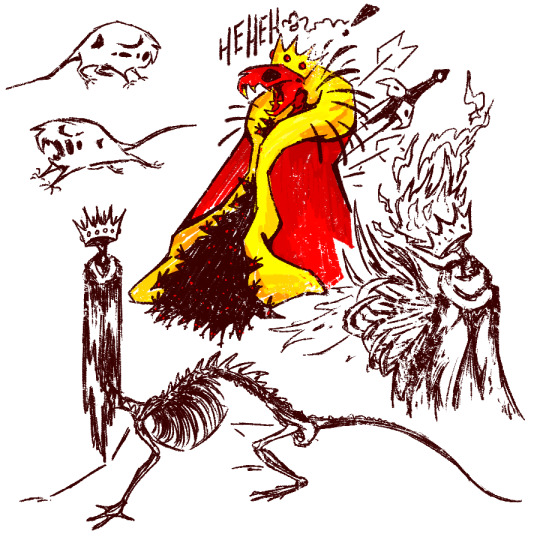
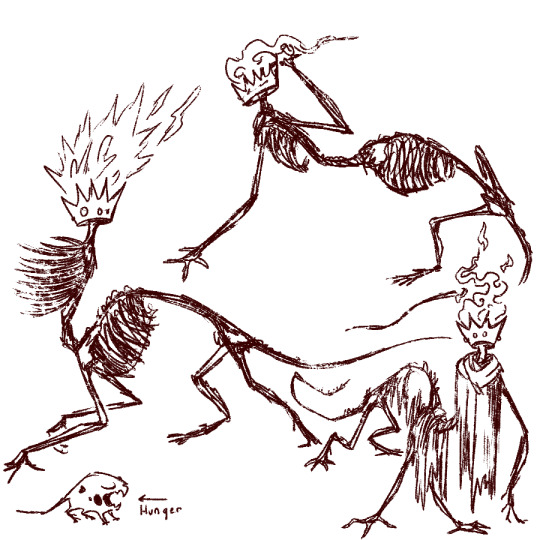
rat concepts feat. not looking at a bone for reference
#oc: rat king#they are cutesy... to ME#also maybe went to darkest dungeon in terms of the designs for the other things...#tw: body horror#the other little freaks are hunger and famine theyre uhhh largely unimportant little bonus guys
210 notes
·
View notes
Text

Fishing Interlude
[First] Prev <–-> Next
#poorly drawn mdzs#mdzs#wei wuxian#lan sizhui#lan jingyi#ONE HUNDERED (+6 bonus) COMICS BABY!!!! WE MADE IT!#There's still at least 200 more to go at the rate I'm going but still! Triple digits for a comic project feels worth celebrating.#I'm no stranger to setting myself on projects but this is certainly the most adventurous and long-term one I've undertaken.#The aim was to be done by the end of September (whoops (I also took a few breaks to post other stuff)) But I'm still having fun!#Thank you all so much for joining me on this journey! I have a celebration announcement tomorrow!#Sorry this one doesn't really feel like a 'comic 100'. It's sandwiched between two comics that were supposed to be 'comic 100'...#I love how excited Jingyi is to be in the garden. And I will never miss an opportunity to have them fish.#Slowly...I am setting up my punchline with all this. I promise it's leading somewhere.#Lan Sizhui didn't fit into the frame for panel 3 so I like to think he dove in after a fish#Afterall that's were lan zhan is in this comic. Under the water. Hunting. LSZ is just following what his mentor taught him.#Sorry I broke Jingyi's characterization for this punchline. He's one of the biggest wangxian shippers in canon. But fishing comes first.
1K notes
·
View notes
Text
I just read the fourth wing bonus chapter and MAN. I knew I wasn't Xaden's biggest fan before but MAN. I honestly don't even know how they ruined a character with so much potential is beyond my understanding???? Xaden is straight up unlikable in the chapter. So many issues in the chapter.
[Caution: Listen, I love Xaden, truly. But he really makes me want to beat him up I'm sorry]
Opinions so far: (Warning: This is not Xaden-friendly I might be a major bitch for 80% 😭)
The chapter felt kind of unnecessary?? Like even if it was a cash grab (which I agree but that's not the point rn) did we really need a bonus chapter that's just the same chapter but just rewritten with some occasional Xaden comments? We could've gotten a new interaction but noooo
With the amount of obsessing talking Xaden does about Dain, you'd think Dain was the one he has a crush on. No because stop this you're literally doing the same thing you accuse everyone of doing to you. "Everyone judges the marked kids just because of what our parents did 🥺🥺👉👈" ISN'T THAT WHAT YOU'RE DOING RIGHT NOW??? Why are you being such a pissy bitch over the fact that he thinks you're bad for her when you literally agree???. [Coherent me update: In hindsight Xaden going out of his way to annoy Dain for entertainment is hilarious not gonna lie. Still think he was being a bitch tho]
The Imogen was missing plotline. Seriously? "Imogen was sick"?? They could just be like oh no she wiped everyone's memories so they don't remember because there is zero canon connection in her being sick. Also the fandom was spot on 💅. To be fair, I can excuse this one.
Xaden's "strategy". Why are we acting like battle strategy is a multiple choice question with one answer??? Where is the common sense?? Where is the individuality??? Where is the originality???
I just noticed this now but WHY IS THE CONTINENT THEY LIVE IN LITERALLY CALLED The Continent???? WHY ARE THEY ACTING LIKE THEY LIVE ALONE IN THE WORLD HELP
FINALLY Emery's last name
Okay I actually like passively possessive simp Xaden because let's be fr he's not noticing anyone other than Violet. He's really acting like the stupid hormonal emo 23 year old he his and I love him for that.
Xaden not understanding sibling dynamics is top tier I love this. Like this man is standing there so confused like 🧍♂️.
Highkey confused at the Lewellen part because I'm pretty sure they were fostered by Lindell?? Either this is shitty writing or a case of an unreliable narrator. Who knows. Not me.
SGAEYL. THAT'S IT. 🛐🛐🛐🛐🛐
"Violet would get over her sister's death eventually" CALM TF DOWN SIR. This is a civilized conversation. Okay but like someone needs to tell these people that murder doesn't solve everything. It's not even the best form of revenge 😭😭😭
I need more backstory on the Cygnis flier drama. Why only that province??? How come other provinces are safe??
"Wasn't my choice," I shrug. Lying is easy, except when it comes to Violet. I haven't quite figured that one out yet. Excuse me what
Okay, I know this is OS buildup but why were the wards down???
"Was it us?" LIAM. MY SWEET BABY BOY ILY YOU'RE THE BEST.
Okay I just realized now that Dain only name drops Rhiannon, Ridoc and Sawyer when he mentions the first years and man how did I not notice that before-
Lots of suspicious stuff. Lots.
IT HAS COME TO MY NOTICE THAT THERE IS A VERY HIGH AMOUNT OF MIRA DYING MENTIONED IN THE CHAPTER AND I DO NOT LIKE IT AT ALL
The bottom line is that I've read too much fanfiction and set my standards too high 😭😭
Anyways stan Liam my sweet summer child 🛐🛐
Update: I just came back from my exam and took a look at what I wrote here and help why was 5am me so salty 😭😭
#I wrote this on 4 hours of sleep before an exam ignore my saltiness#I might get canceled for this tbh why do I make such controversial posts#listen I love fw I really do but I also think it's a bad book in terms of fantasy#pls dont cancel me#fourth wing#fourth wing bonus chapter#xaden riorson#violet sorrengail
21 notes
·
View notes
Note
Heya, do you think ANGEL would have their own theme song?
and if they do what do you think it would sound like?
I've always associated Don't Forget with the Player/Angel so their theme would at least have the motif.
Angel, being based off a pacifist player, would have a more hopeful and light-hearted theme. In comparison to a no-mercy player who may have a darker, more sinister theme.
If we wanna go with non-deltarune-related songs there are a few that I've associated with them.
Angel With A Shotgun - The Cab
Unbroken - ONLAP
Battle Scars - Paradise Fears
Hope Is the Thing With Feathers and Sway to My Beat in Cosmos - Robin, HOYO-MIX, Chevy
There are a few more but they either don't have as strong of vibes as these ones, or they are shared songs. Angel actually shares quite a few songs with Kris.
I have a full playlist for this AU/Deltarune in general. I kinda just merged them since the AU is based off a lot of my personal headcanons and theories for the game.
~ Marshie
P.S. Y'all can send out-of-character questions to my main @marshiemonarch if you want. I don't want this blog to have too much ooc stuff on it
#tbh this list might change in the future#i apologize in advance if angel with a shotgun causes flashbacks of people's nightcore phase#we all have to come to terms with our pasts and accept that the song is a banger#ignore the fact that there are two honkai star rail songs in this list#the hyperfixations overlapped a bit#ooc#marshie speaks#bonus content#angels game au
32 notes
·
View notes
Text
(little experimental piece i did so i could figure out how i want to write isabeau, set some time pre-canon. technically au but its v ambiguous)
---
It’s raining.
The clouds – cumulonimbus, specifically – are coating the sky, an endless torrent falling from them.
Thunder rumbles and lightning strikes at random intervals, sudden lights and sounds coming from all around yo- that’s incorrect. The stimuli comes from above, the reason it feels like it comes from all around you is because your feelings are all over the place and it’s screwing with how you’re perceiving everything that surrounds you.
…
you were never good with storms, were you?
sudden sounds that feel deafening to you, coming with no warning, no way to understand or predict or learn about it because you were too busy being caught in your anxiety.
sudden sounds that feel deafening to you, coming with no warning, no way to understand or predict or learn about it because the schoolkids around you never understood what space or volume was.
or depth and area and circumference and diameter and radius or anything else for that matter.
…
You’re at an inn tonight, thank Change. Being caught in a storm like this on the road would be hell. Well, being in a storm is hell either way, but at least you all got to a secure place of shelter. A place of warmth and comfort and a quiet-enough room you can hide away in and pretend like you’re doing anything but hiding from yourself and this stupid crabbing storm-
You don’t know exactly where you all are, currently. Aside from being in an inn, in a relatively large town. If memory serves you correct (it has to, what else do you have?) your party is…
Somewhere close to the coast, but a lot further down than where you’ve ever been. Even Madame Odile hasn’t been this far down the country, and she’s been all over. (you stayed in the same two crabbing spots in your life)
There’s mountains nearby, that much you know. In all honesty, the lower half of Vaugarde is mostly a mystery to you. You never really got into geography. (you were too busy dealing with yourself)
It might have been a good idea, considering you’re now wandering all about the country with no exact clue where you’re all going. But that doesn’t really matter now. (even though you were never going to say you know anything anyway)
…
…
…
BANG
You stumble, trip and fall face-first onto the bed you’re supposed to be sleeping in tonight.
Crabbing Change you’re a mess today
The thunder is always a surprise, a stupid damn surprise you’re never prepared for.
Your breaths are too shallow now
You slide off the bed onto the floor.
And cry.
And sigh.
You don’t know when the storm will end. Just that with every clap of thunder your heart stops and starts again, a cycle, an endless, repeating loop of panic and calm and panic and calm and panic and calm and panic and calmandpanicandcalmand-
There’s
something
against
your
cheek.
You think
it’s tears
you’re not supposed
to cry
but-
It’s leather. Cold, unnaturally icy to the touch. It settles against your cheeks and stays still. Firm. Gentle. Cold. You can barely feel anything else. Barely hear anything else.
You open your eyes. You don’t remember closing them.
Your heart is in your throat. You don’t even need to see to know who’s knelt down in front of you. Well, mostly standing, really. Only one of your companions wears leather gloves. Lightless, cool to the touch, roughened over untold years of travelling across more than Vaugarde, simple hand-stitching going around the edges, clearly done by an amateur.
Lightless eyes stare back at you. You’ve never seen them so close to you before. It feels like you’re lost in the night sky, tiny glimmers of something beckoning you further away from yourself, a visual siren’s song to the lost, promising a world away from your woes, red stars dancing in front of you-
It’s Sif staring at you.
Oh Change Sif is staring into your eyes HURRY BLINK LOOK AWAY-
You frantically blink and avert eye contact. You can’t speak. You can barely breathe with how hot your cheeks are getting, despite the leather still pressing against them. You can barely process that they’re speaking to you, static lost against your new flurry of emotions.
You jump and freeze again. Oh. More thunder, apparently. You stare at the hardwood floor you’re sitting on. A rich, dark brown. About the same colour as your eyes, even. How funny. You assume it must be very durable, considering it’s being used as flooring for a multi-story inn being hit with a monster of a storm.
Pretty deep brown, some panels a little lighter than others…
“It’s walnut.”
huh
You blink, looking back up at Sif, who’s blinking back at you. His hands are off your face. When did that happen? You blink again.
“The flooring of this inn’s walnut. Rich dark brown, pretty durable, pretty pricey… it lightens with age.”
17 words in a row from Siffrin? They were reasonably loud, too. Like, the normal volume for someone talking.
“The fact that certain panels in the flooring are lighter means they’re older than the other panels, meaning the darker ones were probably replaced.”
24 more words. Add on the 17 and 2 from before and that would be 33 words in the past minute.
You still can’t find any words. They’re standing fully now, looking on you from above, like an an- like a perfectly normal human being who just so happens to be above you currently, crabbing Change Isabeau-
Siffrin is staring at you, blinking. You blink back.
“… you feeling better?”
His voice is quiet again. It feels… musical, almost. A lyre being played in the surf, the tinkling of chimes in the salty air. The songs of the seabirds flying in, the people talking as they gather amongst the market stalls, looking over catches of fish and seafood, the shade away from the scorching sun.
Darkless hair weaved into waves, fluttering about in the coastal winds.
…
You’ve… never properly been to the coast. And you’ve never seen young people with darkless hair. That only happens with much older people.
“Isa.”
Oh right. Sif asked if you were feeling better.
You try to open your mouth and speak, but only a garbled mess of sound comes out. Your cheeks grow warmer, now with the embarrassment of fumbling your words in front of Siffrin. Good job, Isabeau. You’ve done a terrible job.
They turn to the side briefly, a gloved hand raising up to cover their mouth. A cough, maybe? It is cold and wet after all, and they were running through it for a little while before finding their current lodging.
He turns back to you and offers a hand.
“Get up and sit on the bed, at least. Hardwood floors aren’t that comfy.”
You get up. Your bones creak, even though you’re only twenty-four and in good shape. Insulting.
Siffrin does the maybe-cough thing again. You should check if they’re sick, later.
You sit on the bed. It’s comfortable. More comfortable than the walnut flooring. You can call it that, now that you know the wood. You should ask Sif about different types of wood sometime later, since they seem to know a bit about it.
You’re being poked again, in the shoulder this time. You’re tired. It takes a few seconds for you to register what is happening. It takes a few more seconds for you to turn your head, and even more to blink at Sif again.
They sigh, shadows dancing in their eyes.
“Lay down, Isa. Please.”
You blink and do as instructed. You’re… not sure what you’re feeling, aside from exhausted. You haven’t even done anything and you feel like you lifted a hundred kilograms thirty times. That would be a total of three thousand kilograms.
The pillows are cold and soft. You sink into them. You don’t move your legs. You will need to get up again soon, to go downstairs and eat with everyone else.
…
All of whom you’ve been avoiding since you got in.
That’s a problem for future Isabeau. Present Isabeau is currently enjoying the comfy bed he’s laying on, with heavy bones and eyes.
Out of the corner of your vision, you see Sif smile. It’s small, like flower petals in a clear pond of water. He says something you can’t exactly make out, and leaves the room.
Your eyes are heavy.
…
It’s raining. The lightless cumulonimbus clouds coat the sky, torrents raining down.
You’re warm.
It’s nice.
---
trying to understand how i want to write isabeau. he's obviously a smart guy who did a lot of studying, and he has the best emotional intelligence of the party (mira is second), but considering he was such a shy kid i pulled on my experiences as "the shy kid" (i was just autistic and hated people) a little bit.
also headcanon that isa isnt too fond of storms because. loud noises. sudden lights. he likes to know things and he cant exactly know storms. odile is v similar to me in that way.
anyway. ill be back. maybe with more writing. later.
ko-fi for any who want to chuck a couple dollars my way
#lemon time#in stars and time#isat isabeau#not gonna tag siffrin considering this is isa centric. his show not sifs#my writing#also dont think theres any spoilers?????????? maybe if you squint real hard#im including colour in my aus and writing. because i love colour.#HOWEVER. the terms darkless and lightless stay. theyre cool.#anyway can you tell i spent my school years hating almost everyone. can you.#i think ill figure out more when i also write stuff from the others povs. ive got sifs down.#also bonus headcanon for the au: staring into siffrins eyes gives you vibes of the northern island. youll forget it quickly enough tho.#unless you write down what you sense (hint hint odile hint hint)
36 notes
·
View notes
Note
I feel like slate (selectively mute?) Choosing to talk vocally to loft is a sign of trust from slate, mixed in with convenience (hard to sign while gliding for example) and needing to get through Loft's thick skull. But it makes me happy they're close enough that slate felt the sacrifice worth it
i’d say that’s a pretty accurate reading for why he speaks in that scene! it felt right to him in that moment.
while I’d say pre-calamity link (I’ll call him Champion, for future reference) was probably selectively mute, I’m not really sure if that’s exactly the case for Slate 🤔 he prefers to sign and speaks rarely, though probably more often than Champion. How much of that is hold-over muscle memory from Champion? he tries not to think about it.
#ask#bonus content#bonus slate#bonus champion#want to make sure I am using terms correctly#as a general rule I headcanon every link as having some point in their life when they didn’t speak#some speak rarely still and some don’t speak at all
203 notes
·
View notes
Text
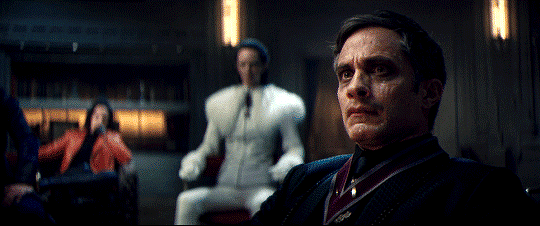
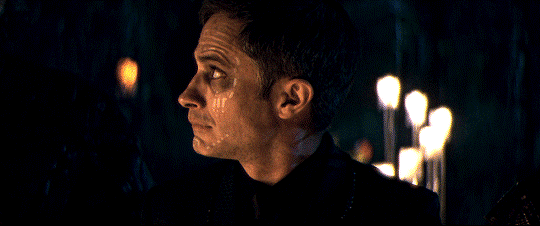
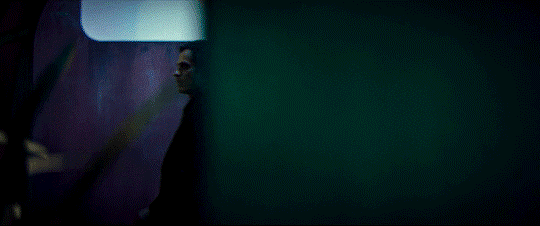
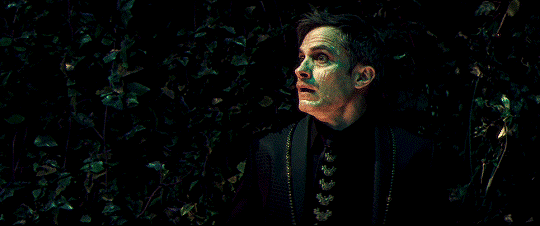
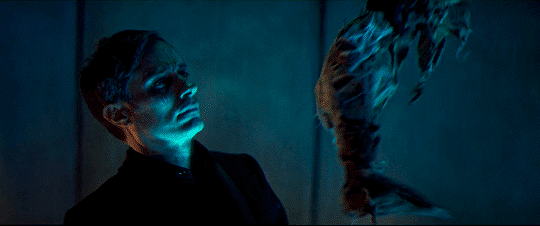
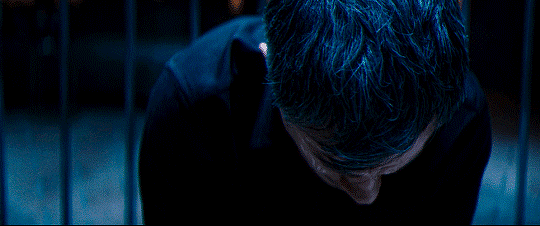
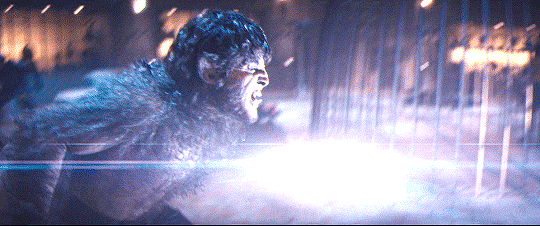
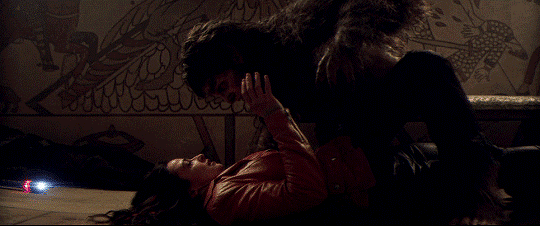
Gael García Bernal in Werewolf by Night / Werewolf by Night in Color (2022 / 2023, dir. Michael Giacchino)
(these gifs also feature Laura Donnelly and an out-of-focus Eugenie Bondurant, plus Carey Jones was in the on-set suit for Ted)
Gifs are all 540px wide so you can click to see larger.
[other gael filmography gifsets]
#gael garcía bernal#werewolf by night#ggb filmography gifs#technically not a film but i don't care#come on i mean it's basically a film#and fidel isn't technically a film either but i'm giffing that#this is the colour version because while if i could only save one of the two it would be the b&w the colours are gorgeous#disconcertingly so in terms of in-universe logic#i mean who installs lighting like that in a crypt just in case a family member gets locked in and needs to have Meaningful Conversations?#but ulysses bloodstone did and i thank him for it#also i deal with the b&w frames all the time for my text posts and this is a bit of a change#wbn obsessives watch this space for bonus gifs#gael garcia bernal#wbn gifs
23 notes
·
View notes